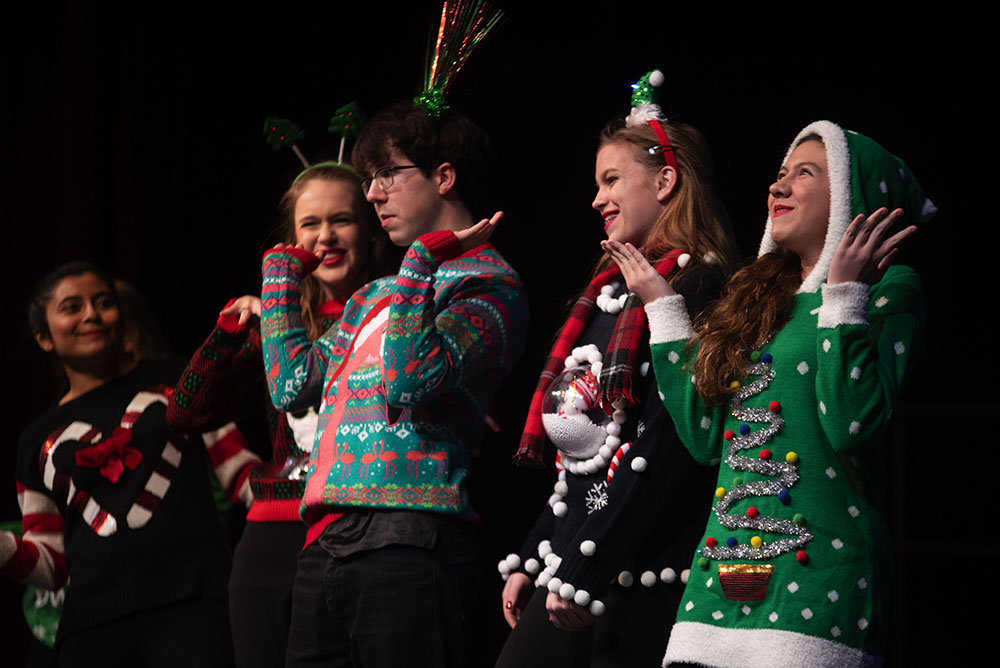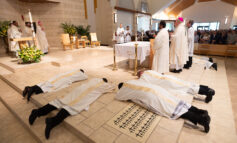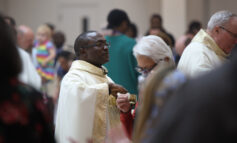
Noah Kilpatrick, center, performs during the annual Christmas Choir Concert at Bishop Lynch High School December 14. (Jenna Teter/Special Contributor)
By Father John Bayer
Special to The Texas Catholic
It’s been many months now since the Feast of Corpus Christi, but the Eucharist has been on my mind ever since, especially as Advent begins and we rekindle our longing for the presence of Christ. The feast was first celebrated in Belgium in 1247 and then extended to the entire Church by Urban IV in 1264 in order to affirm the real, substantial presence of Jesus in the Eucharist. His decision was at least partly occasioned by a miraculous altar cloth (a corporal) that was said to have been stained by a bleeding host during a mass. But what is so important about the real presence of Christ in the Eucharist? Is this just a feat of divine acrobatics, that is, to be present in mystery in the form of bread and wine? What is at stake here?
Until modern times, the Christian tradition had always had a very strong sense for the reality of the sacraments, and especially the Eucharist. For example, St. Justin Martyr, writing in the middle of the second century about the consecrated bread and wine, said, “We do not receive these things as common bread or common drink; but as Jesus Christ our Savior being incarnate by God’s Word took flesh and blood for our salvation, so also we have been taught that the food consecrated by the Word of prayer which comes from him, from which our flesh and blood are nourished by transformation, is the flesh and blood of that incarnate Jesus.” (First Apology 66).
What is so significant about this passage (besides being such an ancient witness to Catholic faith in the Eucharist) is the connection drawn between the reality of Christ in the Eucharist and the reality of Christ in the Incarnation: that is, the measure of the “real presence” of God’s Word in Jesus of Nazareth is the measure of his “real presence” in the Eucharist (notice his expression: “as… so also…”).
Christmas and the Eucharist are a package deal. Now we can begin to understand what is at stake in the Feast of Corpus Christi. The Eucharist is not just a pedagogical tool, like a work of art or a proposition from the catechism, that is, a sign whose function is to refer only to a reality beyond itself. In Jesus of Nazareth, God wanted to do more than teach us; he wanted to be present to us. And this desire of his did not expire at the Nativity or Ascension: and so, he gave us the Eucharist, and the Mystical Body that draws its life from it, the Church.
Many non-Catholics see the Eucharist only as a metaphor or symbol for Christ. But a merely metaphoric or symbolic presence only teaches truth; it is not itself the very truth that is taught. But when Jesus walked the earth, he didn’t teach with merely metaphors, symbols or signs — that is, not exclusively in ways that refer to something beyond himself. The Kingdom of God was ‘really present’ in him as he spoke about it. He did not simply teach about the way, the truth and the life; as he said, “I am the way, and the truth and the life” (John 14:6). The reality taught was ‘really present’ when Jesus walked the earth 2,000 years ago.
And where would we be today, 2,000 years later, if we could not place our faith in this reality still ‘really present’ among us? What if all the actions of the Church were only metaphorical or pedagogical? Christianity would be reduced to a system of ideas, a faith whose substance would be exclusively noetic. But then where is the flesh and blood reality that Jesus promised? Did God retreat back into himself after the Ascension? Did his desire to dwell among us run out?
Of course not. With a great “Amen” let us affirm the love of God at every mass. At every mass let us celebrate that God has his plans and that He is really present to achieve them in our lives. Christianity is not one more moral code and metaphysical system. It is a Body-on-the-move through history. God is not a cosmic referee on the distant sidelines of heaven. He is on the field, muddy and bruised with us, as our team captain. He has a plan, and it was never enough for Him to shout it down from heaven; He enters our history fully in order to achieve it. Our lives are not our own to conduct within the confines of some ideology or set of laws. Our lives are ultimately a “branch” (cf. John 15:1-8) of his own life – if we are really united to Him in the sacraments – and thus the real story is of the Body of Christ, once born in Bethlehem and now coming to full stature in us through the Eucharist.
Father John Bayer, O.Cist., is a theologian and monk at the Cistercian Abbey of Our Lady of Dallas.



